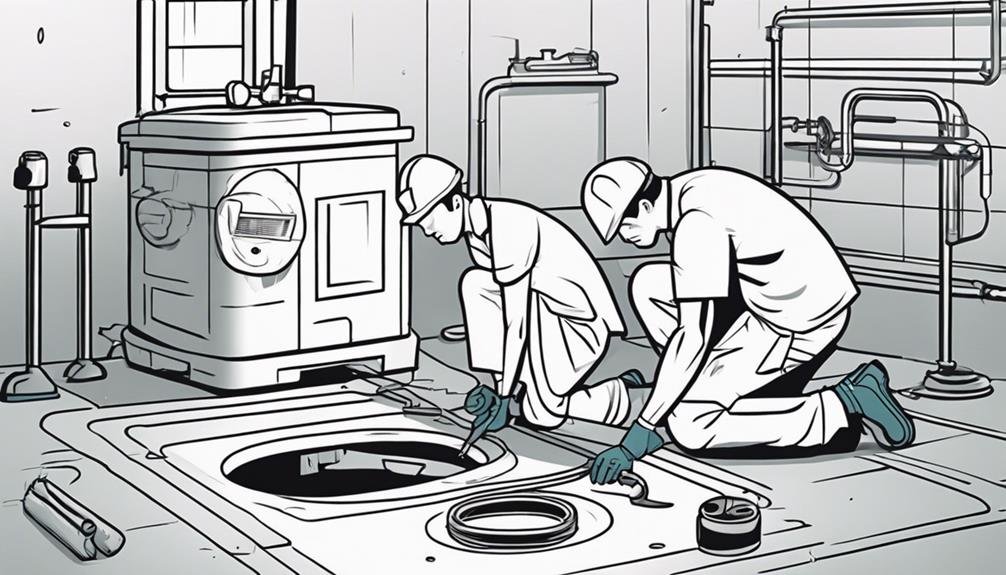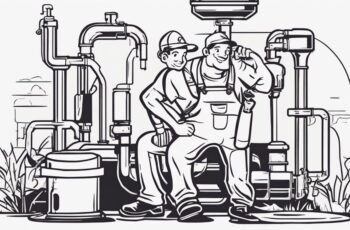When it comes to maintaining your septic tank, think of it as the unsung hero quietly working beneath your property. By implementing a few key practices, you can ensure its longevity and efficiency.
From establishing a regular pumping schedule to being mindful of what goes down the drain, each step plays a vital role in the system's health. But there's a crucial element to this puzzle that often goes unnoticed, one that could save you from costly repairs down the line.
Key Takeaways
- Regular pumping every 3-5 years prevents system failures and environmental harm.
- Choose septic-safe products to maintain bacteria balance and prevent clogs.
- Inspect for abnormalities and promptly repair to avoid costly repairs.
- Use septic-friendly products to preserve the delicate balance of the system.
Regular Pumping Schedule

To maintain optimal system functionality, septic tank experts recommend adhering to a regular pumping schedule every 3-5 years. This preventive measure is crucial in preventing septic system failures and environmental contamination. By pumping your septic tank regularly, you ensure that solids don't build up to levels that could clog the system or cause backups into your home or yard. Neglecting this routine maintenance can lead to costly repairs and potential harm to the environment.
Regular pumping helps in maintaining the balance of bacteria and enzymes in your septic tank, which are essential for breaking down waste. When solids accumulate excessively, they can overflow into drain fields, causing soil and groundwater pollution. By scheduling routine pump-outs, you not only extend the lifespan of your septic system but also reduce the environmental impact of untreated wastewater seeping into the surroundings.
Proper Waste Disposal Practices
Maintaining a proper waste disposal practice is essential for the long-term functionality and environmental health of your septic system. To ensure you're taking the right steps, consider the following:
- Eco-Friendly Options: Opt for biodegradable and septic-safe products to reduce the impact on your septic system and the environment. Look for labels that indicate the products are safe for septic tanks.
- Avoid Hazardous Materials: Refrain from disposing of hazardous materials down the drain or toilet. These substances can harm the beneficial bacteria in your septic tank and potentially lead to system failure. Properly dispose of chemicals, oils, paints, medications, and other hazardous items at designated facilities.
- Regular Maintenance: Implement a regular maintenance schedule to keep your septic system in optimal condition. This includes pumping your tank as recommended and scheduling professional inspections to catch any issues early on.
Inspect for Leaks and Damage

Inspecting your septic system regularly for leaks and damage is crucial to maintaining its functionality and preventing costly repairs. Start by visually inspecting the tank and its components for any signs of cracks, corrosion, or leaks. Repairing cracks promptly is vital to prevent further damage and avoid leaks that can contaminate the surrounding soil. Additionally, monitor the levels in your septic tank to ensure that it's operating within normal parameters. Sudden changes in levels could indicate a problem that needs immediate attention.
To thoroughly inspect for leaks, check the ground around the tank for any unusual wet patches or foul odors. These could be signs of leakage and should be addressed promptly. Pay attention to the vegetation near the tank, as an unusually lush or greener area might indicate a leak that's fertilizing the plants. By staying vigilant and addressing any issues promptly, you can prevent major damages and ensure the smooth operation of your septic system.
Use Septic-Friendly Products
Utilize septic-safe cleaning products to preserve the health and efficiency of your septic system. When selecting cleaning agents, opt for eco-friendly alternatives that are gentle on your septic system while effectively cleaning your home.
Here are three key points to help you maintain the chemical balance in your septic tank:
- Read Labels Carefully: Look for labels that specifically mention being safe for septic systems. Avoid products with harsh chemicals like bleach, ammonia, or antibacterial agents that can disrupt the natural balance of bacteria in your tank.
- Choose Natural Ingredients: Consider using products with natural ingredients like vinegar, baking soda, or essential oils. These alternatives are less likely to harm the beneficial bacteria in your septic tank while still providing effective cleaning.
- Biodegradable Formulas: Opt for biodegradable formulas that break down easily without causing harm to the environment or the delicate balance of your septic system.
Maintain Drainfield Health

To ensure the longevity and optimal performance of your septic system, prioritize the health of your drainfield through proactive maintenance measures. Preventive measures play a crucial role in preserving the functionality of your drainfield. Regularly inspect the area for any signs of standing water, foul odors, or lush green patches, as these could indicate potential issues that need to be addressed promptly. Additionally, avoid planting trees or shrubs near the drainfield to prevent root intrusion, which can clog the system and impede proper drainage.
Soil treatment is another key aspect of maintaining drainfield health. Be cautious of what substances come into contact with the soil above your drainfield. Harsh chemicals, excessive grease, and non-biodegradable materials can disrupt the natural balance of soil bacteria essential for waste breakdown. Consider using septic-safe cleaning products and limit the use of antibacterial soaps to safeguard the soil's microbial community. By taking these preventive measures and practicing proper soil treatment, you can ensure the longevity and efficiency of your septic system.
Frequently Asked Questions
How Can I Prevent Roots From Infiltrating My Septic Tank System?
To stop roots from invading your septic tank system, implement preventive measures like installing root barriers. These barriers act as shields, preventing roots from causing damage. Consult professionals for expert advice on the most effective root barrier solutions for your system.
Are There Any DIY Methods for Maintaining a Healthy Septic Tank System?
To maintain a healthy septic tank system, you can use organic additives and bacterial supplements. Additionally, make sure to schedule regular pumping and practice proper disposal methods. These simple DIY steps will keep your system running smoothly.
What Are the Signs That Indicate a Septic Tank System Needs Repairs or Replacement?
If you notice septic tank leaks or drain field issues, it's time for repairs or replacement. Act swiftly to prevent further damage. Professional assessment and maintenance are crucial to keep your septic system functioning properly.
Can Heavy Rainfall Affect the Performance of a Septic Tank System?
When heavy rainfall hits, soil saturation rises, causing drainfield flooding. This can stress your septic tank system, leading to performance issues. Regular maintenance can help prevent problems, ensuring your system works efficiently despite the weather.
What Should I Do if I Notice Foul Odors Coming From My Septic Tank System?
If you notice foul odors from your septic tank, start with a visual inspection for any leaks or clogs. Consider using odor control products designed for septic systems. Regular maintenance like pumping and inspections can also prevent such issues.
Conclusion
Remember, maintaining your septic tank is vital for its longevity and efficiency. By following a regular pumping schedule, practicing proper waste disposal, inspecting for leaks, using septic-friendly products, and maintaining the health of your drainfield, you can ensure your septic system stays in top shape.
Don't delay in taking care of your septic system – it's a crucial component of your home's infrastructure.
Stay savvy and safeguard your septic system!

